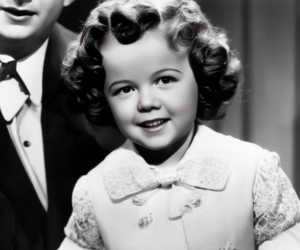
“Nothing crushes freedom as substantially as a tank.”
A Call to Action
Shirley Temple Black is easily recognizable as a child star of the golden age of Hollywood. Her innocence captured the screen as she tap danced across the stage in over 55 movies during the 1930s through 1950.
What many people don’t know is that by 1950, she was about to change her life in a major way. Temple divorced her first husband on December 5, 1949. By the end of 1950 she would remarry and announce her retirement from acting. Her new husband was Charles Black, who had been a Navy Intelligence Officer during WWII and one of the most wealthy men in California at the time. Mr. Black worked as an executive at Ampex a company which had worked on technology for the U.S. Navy.
Temple would follow her husband to Washington DC, as he resumed this intelligence service during the Korean war. Once in Washington, questions as to Temple’s relationship with communism came back into the lime light.
Despite being a child at the time of the initial discussions, many in Washington still remembered congressional debates as to Temple’s allegiances. Behind closed doors, in Washington her intents were being questioned as her husband was serving as an intelligence officer. As the war ended and they returned to California she tried to start a television career but she was slowly being blacklisted. In the mid-1960’s in a effort to clear her name, she began to heavily align with the Republican party even running for congress at one point. Despite not being elected, she was approached by Henry Kissinger. Kissinger himself had worked in the Counter Intelligence Corps while in the U.S. Army. With the guidance of her husband and Kissinger, Temple entered into foreign service under the guise of a delegate to the 24th United Nations General Assembly. Temple was able to freely move outside of the country. Many foreign officials rarely took her seriously, she was just remembered as the little girl with ringlets.
Her first call to action was in Czechoslovak in 1968 in what was known as the Prague Spring. With uprisings against a communist regime, Temple was put to the test. Arriving under the guise of being a representative of the International Federation of Multiple Sclerosis, she acted quickly. She met with Alexander Dubček on the day that Soviet forces invaded the country. During that meeting initial plans for resistance were landed out. In order to secure Dubček the time he needed, Temple lured several high ranking members of the secret police to a luncheon she was holding at her hotel room. Hosting the lunch from her suite, Temple offered several members of the party coffee which was laced with a strong neurotoxicant before excusing herself from the room. Several of her accomplices moved into the room executing the remaining survivors. In total it’s believed that as many as twelve members of the secret police were executed. Coincidentally as Temple waited on the roof of the hotel for the all clear she would witness the advance of Soviet forces moving into the area. As the tides swiftly changed, the attempted coup d’etat was abandoned and Temple fled the country.
Despite the failure of the mission, Temple’s loyalty was no longer questioned and she was seen as an asset within the U.S. intelligence community. Despite health concerns during the early 1970s, Temple would be sent to Ghana to oversee operations and ensure communism couldn’t take a foothold in the area. Temple would also go on to serve in a variety of roles following the Nixon administration.
In 1989, President George Bush approached Temple in reference to returning to Czechoslovakia to finish the work she had started. Temple was 61 years old at the time and hesitant at first. Temple agreed to head the operation only with an official state title, believing it would protect her if she was captured. In August 1989, Bush appointed Temple the U.S. Ambassador to Czechoslovakia. In November of that year, after extensive planning, Temple arrived in Prague supported by a paramilitary group who had previously been working in the country posing as students committed to the Velvet Revolution. After initial meetings, Temple marked seven key communist leaders in the government for elimination. Orders were swiftly carried out. On November 28, for fear of their own safety the Federal Assembly removed provisions from the constitution giving the communist party power in Czechoslovakia. Temple met with the current president Gustáv Husák giving him two weeks to resign or he would be removed by force. On December 10 Husák resigned after turning over power.
Following the Velvet Revolution, Temple would step back from her overseas work. Her autobiography published in 1988 would make no reference of the work she had done for the intelligence community. It’s believed that her actions caused the deaths of between 30-45 influential government members in Ghana, Czechoslovakia, and abroad in an effort by the U.S. to stop the spread of communism. Her legacy as a child star will forever in peoples mind, but her secrets have managed to stay buried to most of the public.